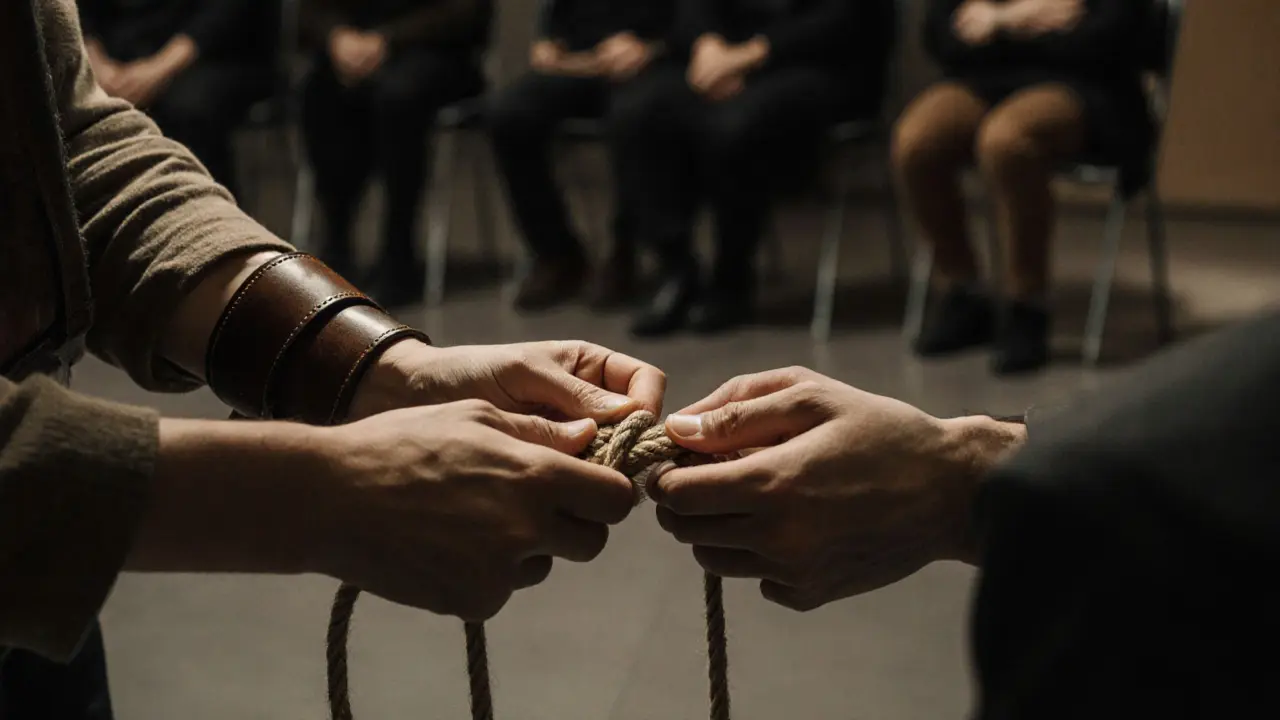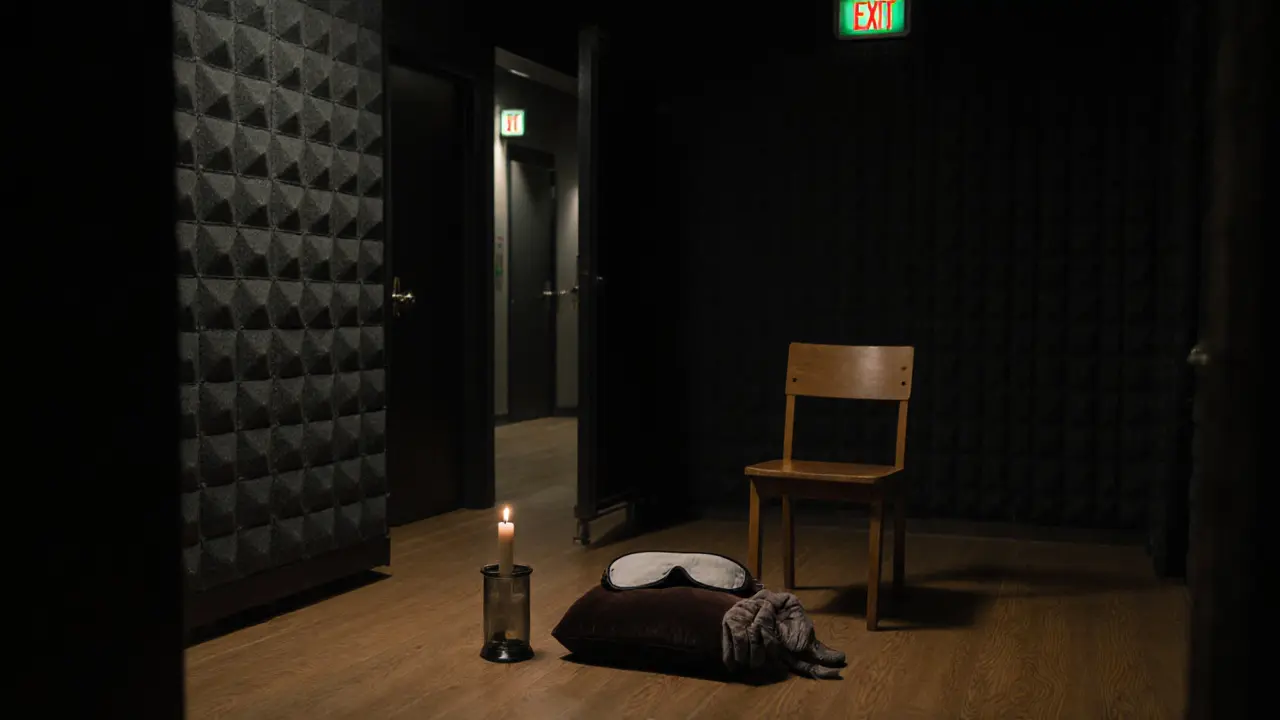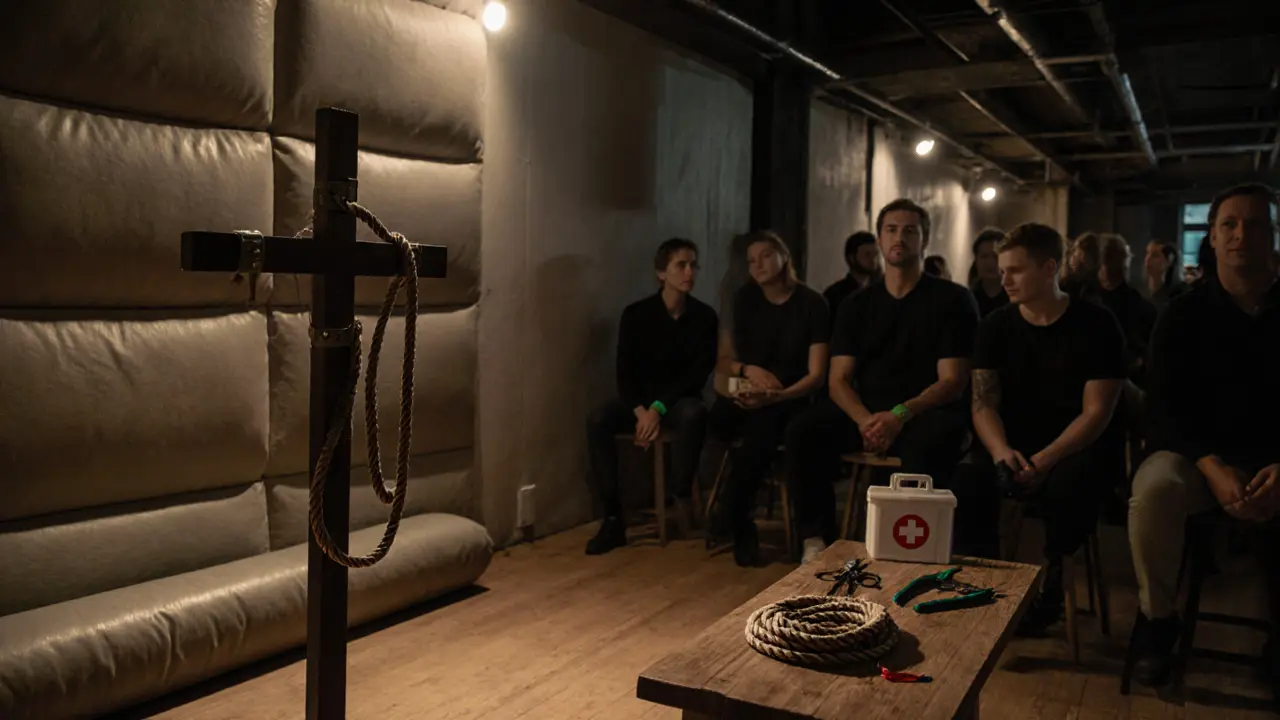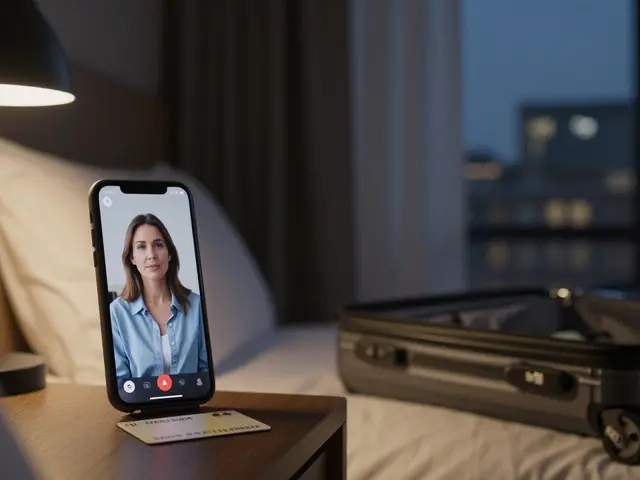Most people think of Bondage London events as something hidden, exclusive, maybe even intimidating. But if you’ve ever walked past a discreet door in Shoreditch or noticed a flyer tucked under a bench near Old Street, you know there’s more to it than rumors. These aren’t wild parties with no rules-they’re carefully organized gatherings where people explore power, trust, and connection in ways most never see.
What Actually Happens at Bondage London Events?
Bondage London events aren’t about chaos. They’re structured, safe, and often surprisingly quiet. Most take place in private venues-old warehouses converted into play spaces, or rented studios with soundproofing and padded walls. You won’t find flashing lights or loud music. Instead, there’s ambient lighting, soft jazz, and the occasional clink of metal cuffs.
Attendees range from curious newcomers to seasoned practitioners. Some come alone, others with partners. There’s no dress code, but most wear something that signals their role: black leather, lace, or simple clothing with a single statement piece-a collar, a harness, or a pair of fingerless gloves. The key is intention, not costume.
Events usually start with a brief orientation. A host walks through safety rules: safe words, consent checks, boundaries. Then people mingle. There’s no pressure to play. Many just watch, learn, or chat. You’ll find people discussing rope techniques, sharing stories about their first scene, or asking how to find a reliable partner.
Play areas are clearly marked. One corner might have a St. Andrew’s cross. Another has a suspension rig. A third is set up with spanking benches and floggers. Each space has a volunteer monitor-someone trained in first aid and scene safety-who keeps an eye out, steps in if needed, and makes sure no one crosses a line.
Who Goes to These Events?
The myth is that everyone at Bondage London events is part of some underground cult. The truth? They’re your neighbors, your coworkers, your barista. One regular, a 38-year-old accountant from Croydon, told me he comes every other month. "It’s the only place I feel completely myself," he said. "No pretending. No judgment. Just honesty."
There are students, nurses, teachers, artists, and retirees. Women make up nearly half the crowd. Many come as dominants for the first time. Others are submissives who’ve spent years searching for a community that doesn’t shame them.
Age ranges from early 20s to late 60s. There’s no typical profile. What unites them is a shared understanding: this isn’t about sex-it’s about control, vulnerability, and emotional release. Many attendees say they’ve never felt more connected to someone than during a silent, slow bondage session.
How Do You Find These Events?
You won’t find them on Instagram or Facebook. Most are invitation-only or require pre-registration through private forums. The main hub is a moderated online group called Bondage London a private community network for BDSM practitioners in Greater London, founded in 2018 with over 3,200 verified members. It’s not a dating app. It’s a directory of events, vetted venues, and safety resources.
To join, you need to submit a short application explaining why you want to participate. No photos, no personal details-just your intent. If approved, you get access to a calendar. Events are listed by date, location, theme (e.g., "Rope Play Night," "Sensation Play Workshop"), and skill level required.
First-timers are encouraged to attend "Newcomer Nights," which happen twice a month. These are low-pressure, with mentors available to answer questions. You don’t have to play. You don’t even have to touch anyone. Just showing up is enough.

Safety Is Everything
At every Bondage London event, safety isn’t optional-it’s the foundation. Every participant must agree to the Safe, Sane, and Consensual (SSC) a core ethical framework used in the UK BDSM community since the 1990s, emphasizing informed consent, risk awareness, and mutual respect guidelines. Many also follow Risk-Aware Consensual Kink (RACK) a more flexible approach that acknowledges all activities carry some risk, but prioritizes personal responsibility and communication.
Each event has at least two trained safety monitors. They carry first aid kits, shears for cutting restraints, and a list of emergency contacts. They’re not there to police-you’re not there to be watched. They’re there to intervene if someone says "red," or if someone looks like they’re in distress.
Consent isn’t just a word here. It’s a ritual. Before any scene begins, participants use a simple checklist: "What are your limits? What’s your safe word? Are you sober? Do you need a check-in after?" These aren’t formalities. They’re lifelines.
What You Won’t See
You won’t see public nudity. You won’t see anyone forced into anything. You won’t see alcohol served on-site. Most events are dry-no drugs, no intoxicants. This isn’t a club. It’s a space for presence.
You won’t find cameras. Phones are banned. No photos, no videos, no screenshots. Violating this rule means immediate expulsion and permanent ban. Privacy is non-negotiable.
You won’t see stereotypes. No leather-clad dominatrixes with whips shouting orders. No men in masks dragging people around. Real bondage is often slow, quiet, and deeply intimate. A single rope tied around a wrist, a whispered "thank you," the weight of a blindfold-these moments matter more than spectacle.

Why People Keep Coming Back
People don’t come for the thrill. They come because they finally feel seen.
One woman, who works in finance and has never told her family about her interests, said her first event changed her life. "I thought I was broken," she told me. "Then I sat in a circle with eight strangers, and each of them said, ‘Me too.’ I didn’t cry. I just breathed. For the first time in years, I didn’t have to hide."
Others come for the structure. In a world that rewards constant performance, these events offer stillness. A scene can last 20 minutes or two hours. There’s no rush. No expectation to perform. Just presence.
Many say they’ve improved their relationships outside the scene. Learning to communicate boundaries, to listen without fixing, to say "no" without guilt-these skills don’t stay in the playroom. They spill into everyday life.
Is This for You?
If you’re curious, start by reading the community guidelines. Go to a Newcomer Night. Sit in the back. Watch. Listen. Ask one question. That’s all you need to do.
You don’t need experience. You don’t need the right clothes. You don’t need to be "kinky" enough. You just need to be willing to be honest-with yourself and with others.
If you’re not sure, that’s okay. You’re not supposed to know everything yet. That’s why these events exist: to help you find out, slowly, safely, without pressure.
There’s no rush. No deadline. No one’s keeping score. Just a quiet room, a few people who understand, and the chance to step into a version of yourself you’ve never let out.
Are Bondage London events legal in the UK?
Yes, as long as all activities are consensual, private, and involve adults. The UK recognizes the principle of informed consent in BDSM under the 2003 Sexual Offences Act. Public displays or non-consensual acts are illegal, but private, negotiated scenes in licensed venues are protected under personal autonomy laws.
Do I need to be in a relationship to attend?
No. Most attendees come alone. Many are single. Others are in relationships but attend separately. The community welcomes individuals regardless of relationship status. The focus is on personal exploration, not coupling.
How much does it cost to attend?
Most events cost between £15 and £35, depending on venue and duration. Some workshops run higher, around £50. First-time visitors often get a discounted rate or free entry during Newcomer Nights. Payment is cash-only or via encrypted app-no credit cards are accepted to protect privacy.
What if I’m nervous or don’t know what to do?
Nervousness is normal. Everyone feels it the first time. Newcomer Nights are designed for exactly this. Volunteers wear colored wristbands-green means "I’m here to help," red means "I’m playing, don’t interrupt." Approach anyone in green. They’ll answer your questions, explain the space, and let you go at your own pace.
Can I bring a friend?
Yes, but both must apply separately and be approved. Friends are welcome, but the community discourages bringing people just to show off or for novelty. The goal is personal growth, not entertainment. If you’re unsure, ask the event organizer before registering.
Are there events for beginners who only want to observe?
Yes. "Observer Nights" are held monthly. These are silent, non-participatory sessions where you can sit quietly and watch scenes unfold. No talking, no photos, no interaction. Just learning through presence. Many people spend months observing before they ever touch a rope.
Is there gender or sexual orientation diversity?
Yes. The community is intentionally inclusive. Events welcome all genders, sexual orientations, and identities. Trans, non-binary, and queer individuals make up a significant portion of attendees. Many workshops focus on inclusive language, consent across identities, and creating space for marginalized voices.
What if I have a physical disability or chronic pain?
Bondage London events are increasingly accessible. Many venues are wheelchair-friendly. Rope techniques can be adapted for limited mobility. Sensory play, breathwork, and emotional bonding are alternatives to physical restraint. You’re encouraged to disclose your needs during registration-accommodations are made without judgment.
Do I need to bring my own gear?
No. Most venues provide basic equipment: ropes, cuffs, blindfolds, spanking paddles. Beginners are encouraged to use what’s available. If you bring your own gear, make sure it’s clean and labeled. No shared gear is used without explicit permission.
How do I know if I’m ready to try something?
You’re ready when you feel curious, not pressured. Start with a workshop. Read the safety guidelines. Talk to someone who’s been there. Try a 10-minute sensation play session-warm wax, feathers, ice. If it feels right, you’ll know. If it feels like a chore, stop. There’s no timeline. Your comfort is the only standard that matters.
If you’re wondering whether this world is for you, remember: you don’t have to be perfect. You don’t have to know everything. You just have to be willing to show up-and let yourself be human.




